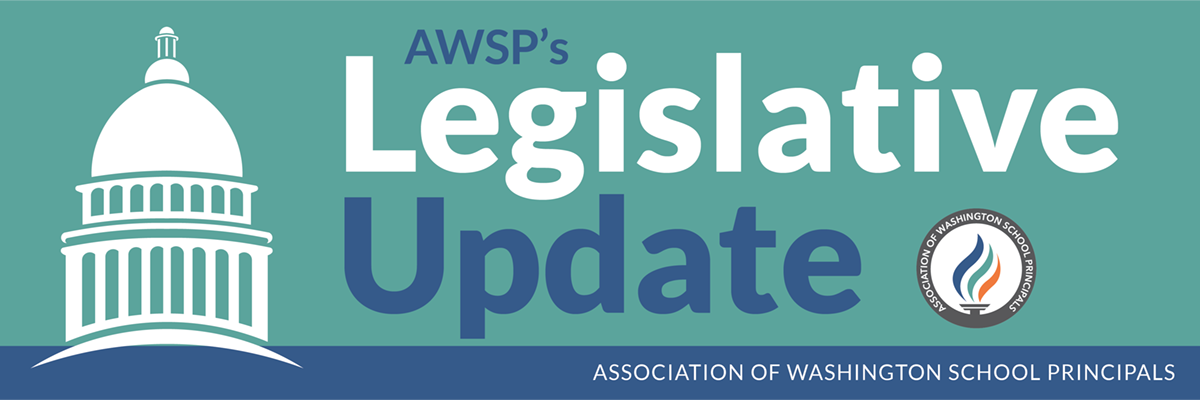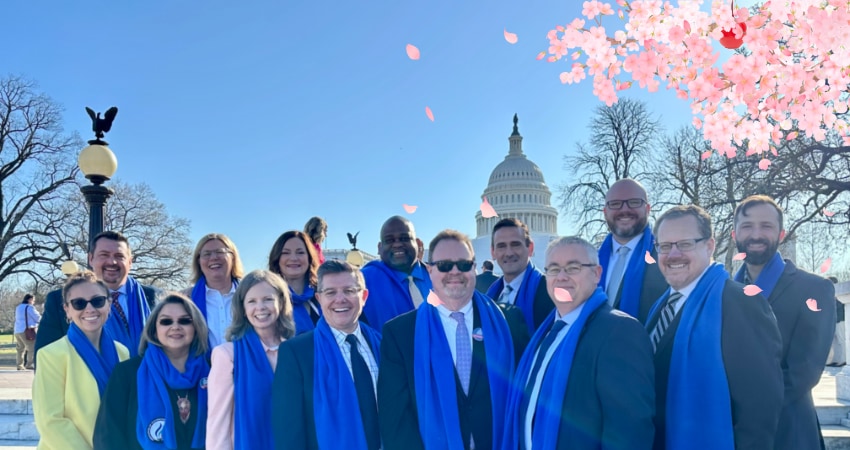
🌸🍒 Cherry Blossoms With a Cherry on Top 🌸🍒
What an amazing week of advocacy here in our Washington and in the “other” Washington, our nation’s capital. Our 12 principals arrived just in time for peak cherry blossom viewing. What a treat!
 AWSP staff and members representing in D.C.
AWSP staff and members representing in D.C.The National School Leaders Advocacy Conference is organized each March by NAESP and NASSP. We spent the first two days learning from expert panels, congressional staff, principals from around the country, and Cindy Marten, Deputy Secretary of the Department
of Education, about various pieces of federal legislation and effective advocacy strategies. On Wednesday, over 400 principals headed to the Capitol to meet with their members of Congress to talk about educator shortages, improving school mental health,
wellness, and safety resources, and various budget priorities. Our group shared poignant stories about students and staff in their buildings related to each area, and we built relationships with decision-makers and principals from other states.
Here in our Washington, the cherry on top for this week was listening to the House Education Committee pass SB 5175 out of their committee
unanimously! An amendment was added to clarify that a superintendent might offer a contract for more than one year when a principal has:
- been employed as a principal for three or more consecutive years;
- been recommended by the superintendent as a candidate for a two or three-year contract because the principal has demonstrated the ability to stabilize instructional practices, and received a comprehensive performance rating of level 3 or above in
their most recent comprehensive performance evaluation; and
- met the school district's requirements for satisfying an updated record check.
We appreciate your messages to legislators encouraging them to support this bill and look forward to watching it pass off the House floor soon.
House Budget
This week, the House released its budget. We knew it would have less funding than the Senate did for key programs like special education and transportation, but there are a few items that the House included that the Senate did not. I’ll look for
a side-by-side comparison of these budgets next week to share with you. In both budgets, legislators would take ESSER funds allocated to OSPI (not to individual districts) and reroute these dollars to programs in this year’s operating budget.
As you can imagine, this is not sitting well with people. Stay tuned for how this might be resolved.
Here are some of the highlights from the House budget:
K-12 Education Increases
K-12 Salaries and Compensation ($593 million 2023-25; $1.67 billion 5-year total)
Salary allocations are increased for inflation as provided in HB 1732 (K-12 inflation adjustments) and rebasing. Budgeted inflation for salaries is 3.7% in the 2023-24 school year (SY) and 3.9% in the 2024-25 SY.
SEBB health benefit rates are increased to $1,116 per employee per month in the 2023-24 SY and $1,178 per employee per month in the 2024-25 SY. These amounts are in addition to the $734 million in 2023-25 and $2.3 billion 5-year for salary inflation at
maintenance level.
Special Education Enhancements ($94 million 2023-25; $67 million Federal 2023- 25; $366 million 5-year total)
Funding is provided to increase excess cost multipliers, raise the funded enrollment limit, support inclusionary practices, and lower the safety net threshold as required under HB 1436 (Special education funding). Funding is also provided for summer evaluations, and extended transition supports.
Free School Meal Expansion ($56.4 million 2023-25; $28.5 million Federal 2023-25; $178 million 5-year total)
Funding is provided to support expanded access to free meals through the federal Community Eligibility Provision pursuant to HB 1878 and HB 1238 (Free school meals).
Dual Credit Enrollment Enhancements ($19.4 million 2023-25; $36.9 million 5-year total)
Funding is provided to increase the Running Start combined maximum enrollment cap from 1.2 FTE to 1.6 FTE.
Transition to Kindergarten ($14.7 million 2023-25; $26.6 million 5-year total)
Funding is provided for the implementation of HB 1550 (Transition to Kindergarten), which creates the Transition to Kindergarten (TTK) program beginning in the 2024-25 school year. Funding is sufficient to support 5,077 FTE students in the TTK program during the 2024-25 school year.
Professional Education Workforce ($12.0 million 2023-25; $31.7 million 5-year total)
Funding is provided for the implementation of HB 1565 (Prof. education workforce), which establishes a teacher residency program and establishes educator workforce data collection and analysis requirements. Funding is sufficient to support five teacher residency cohorts with 17 residents per cohort, beginning in the 2024-25 school year. Additional funding is provided for the Beginning Educator Support Team (BEST) program to increase the number of beginning teachers who receive mentoring support. This funding is important to us because there may be some funds here for additional principal mentors.
Bills That Keep Moving
Here are a few key bills that keep moving. Some are still making their way through fiscal committees and need to pass out of those committees by Tuesday, April 4, the next cut-off day. Some bills don’t have a fiscal impact and are waiting on a vote
by either the House or the Senate.
Both of the special education funding bills are still alive. The Senate bill, SB 5311, would raise the special education cap from 13.5%
to 15% and increase the multiplier at a greater rate than the House. The House version, HB 1436, funds special education at a lower
level.
SB 5174 is the transportation funding bill. This bill was narrowed from its original version and would create
the Transportation Safety Net. Safety net awards would be provided to school districts with a demonstrated need for additional transportation funding for special passengers, as mentioned above.
HB 1550 is the Transition to Kindergarten bill. The current version is much improved, and it would rename Transitional Kindergarten
as the Transition to Kindergarten program, and state that this program is not part of the state's program of basic education. It directs OSPI to adopt rules for the administration and the allocation of state funding for this program and specifies
minimum requirements for these rules. And it provides a funding formula for the program using certain portions of the prototypical school funding model and requires certain data to be reported. Current TK programs will remain in place for the 2023-24
school year, but changes would come in the following school year.
HB 1658 would authorize high school students to earn up to two elective credits for paid work experience.
If you are interested in small school construction, SB 5126 (common school trust revenue to the small school modernization
program) is still moving, and the Senate Capital budget gets a good review by OSPI for its attention to small schools.
SB 5048 is a fantastic bill that passed the Senate. This bill will require institutions of higher education to
provide enrollment and registration in College in the High School courses at no cost to students in grades 9 through 12 at public high schools.
HB 1207 is now in the Senate, and it would change the term "emergency expulsion" to "emergency removal" and permit certain students
to request that their records use the new term. It would also require OSPI to develop a model student handbook that includes, among other things, a complaint procedure related to harassment, intimidation, bullying, and discrimination.
HB 1308 says that school districts may offer students the opportunity to meet graduation pathway requirements by completing a performance-based
learning experience through which the student applies knowledge and skills in a real-world context, providing evidence of applying state learning standards to ELA and math standards (this was amended from the original version that allowed students
to choose two of the core areas).
SB 5243 passed the Senate, and it would revise high school and beyond plan (HSBP) requirements and require OSPI to facilitate the transition
to and adoption of a common online platform for HSBPs. It would require school districts to provide access to an adopted universal platform within two years of platform development.
The recess bill, SB 5257 has now passed both the House and the Senate and requires 30 minutes of recess and encourages recess before
lunch. It also includes language that discourages withholding recess for disciplinary or academic reasons.
HB 1316 is another dual credit bill that would allow Running Start students to be funded up to a combined maximum
enrollment of 1.6 FTE. It would also allow high school graduates with 15 or fewer college credits to earn before meeting associate degree requirements to continue participation in the summer academic term following graduation. Senator Hawkins intends
to add a floor amendment to this to add 10th grade Running Start (one online class only per quarter).
HB 1565 has a short title of the “Educator Workforce Act.” This bill establishes a teacher residency
program and continues work to identify the quality and effectiveness of educator preparation and workforce programs. It has been amended to focus on establishing residency programs for special education teachers only.
There are a quite a few bills that didn’t make it, including HB 1113 on educator reprimands, HB 1478 on student rights, HB 1479 on restraint and isolation, and SB 5054 on PLCs. If you have questions about a bill that isn’t listed,
reach out to me.
Next Week
The fiscal committees have some long agendas today and through the weekend to hear the remaining bills that need to pass out by April 4. After that, it’s back to the floor for a few weeks to pass bills out from the opposite house and on to the Governor.
Meanwhile, the budget writers will try to reconcile their differences behind the scenes to create final operating, transportation, and capital budgets. Check out my latest bill tracking list for a quick look at the bills being acted upon next week and a list of the bills still moving through the Legislature.
Get Involved
Our advocacy efforts need all of our voices to contribute to the process. There are many different ways (big and small) that you can get involved in these efforts. If you have questions or comments or want to get involved, please reach out to me.
Thank you so much!
